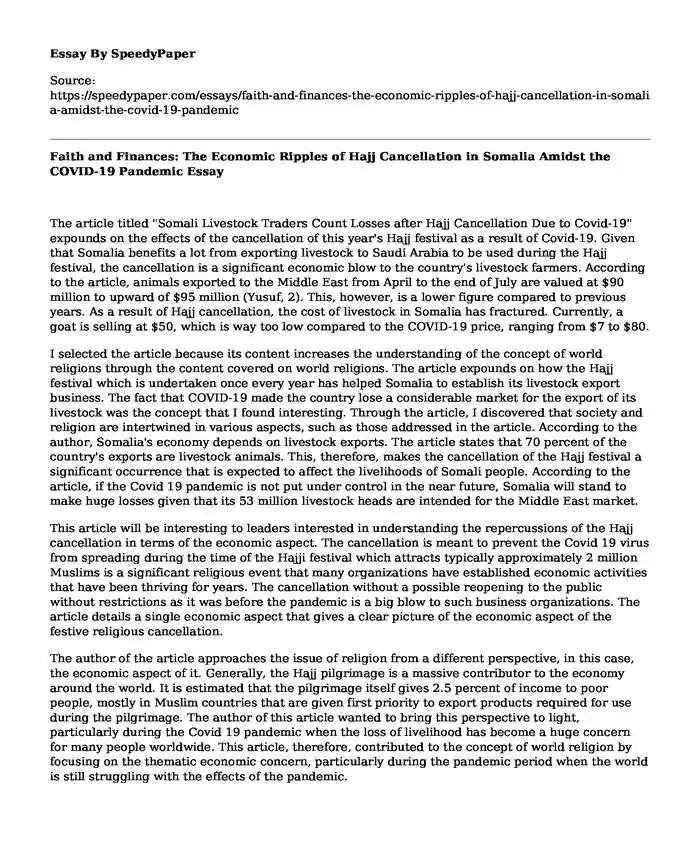The article titled "Somali Livestock Traders Count Losses after Hajj Cancellation Due to Covid-19" expounds on the effects of the cancellation of this year's Hajj festival as a result of Covid-19. Given that Somalia benefits a lot from exporting livestock to Saudi Arabia to be used during the Hajj festival, the cancellation is a significant economic blow to the country's livestock farmers. According to the article, animals exported to the Middle East from April to the end of July are valued at $90 million to upward of $95 million (Yusuf, 2). This, however, is a lower figure compared to previous years. As a result of Hajj cancellation, the cost of livestock in Somalia has fractured. Currently, a goat is selling at $50, which is way too low compared to the COVID-19 price, ranging from $7 to $80.
I selected the article because its content increases the understanding of the concept of world religions through the content covered on world religions. The article expounds on how the Hajj festival which is undertaken once every year has helped Somalia to establish its livestock export business. The fact that COVID-19 made the country lose a considerable market for the export of its livestock was the concept that I found interesting. Through the article, I discovered that society and religion are intertwined in various aspects, such as those addressed in the article. According to the author, Somalia's economy depends on livestock exports. The article states that 70 percent of the country's exports are livestock animals. This, therefore, makes the cancellation of the Hajj festival a significant occurrence that is expected to affect the livelihoods of Somali people. According to the article, if the Covid 19 pandemic is not put under control in the near future, Somalia will stand to make huge losses given that its 53 million livestock heads are intended for the Middle East market.
This article will be interesting to leaders interested in understanding the repercussions of the Hajj cancellation in terms of the economic aspect. The cancellation is meant to prevent the Covid 19 virus from spreading during the time of the Hajji festival which attracts typically approximately 2 million Muslims is a significant religious event that many organizations have established economic activities that have been thriving for years. The cancellation without a possible reopening to the public without restrictions as it was before the pandemic is a big blow to such business organizations. The article details a single economic aspect that gives a clear picture of the economic aspect of the festive religious cancellation.
The author of the article approaches the issue of religion from a different perspective, in this case, the economic aspect of it. Generally, the Hajj pilgrimage is a massive contributor to the economy around the world. It is estimated that the pilgrimage itself gives 2.5 percent of income to poor people, mostly in Muslim countries that are given first priority to export products required for use during the pilgrimage. The author of this article wanted to bring this perspective to light, particularly during the Covid 19 pandemic when the loss of livelihood has become a huge concern for many people worldwide. This article, therefore, contributed to the concept of world religion by focusing on the thematic economic concern, particularly during the pandemic period when the world is still struggling with the effects of the pandemic.
Work Cited
Yusuf, M. "Somali Livestock Traders Count Losses after Hajj Cancellation Due to Covid 19" VON News. Published by associated press. Publication date; July 29, 2020. Retrieved from: https://www.voanews.com/africa/somali-livestock-traders-count-losses-after-hajj-cancellation-due-covid-19. Date of retrieval: December 5, 2020.
Cite this page
Faith and Finances: The Economic Ripples of Hajj Cancellation in Somalia Amidst the COVID-19 Pandemic. (2024, Jan 19). Retrieved from https://speedypaper.com/essays/faith-and-finances-the-economic-ripples-of-hajj-cancellation-in-somalia-amidst-the-covid-19-pandemic
Request Removal
If you are the original author of this essay and no longer wish to have it published on the SpeedyPaper website, please click below to request its removal:
- Essay Example on the Operational Excellence of Capitec Bank
- Lab Report Example Based on Cardiovascular/Respiratory Experiment
- Essay Example. Nursing Theory Selected
- Essay Example: Rhode Island Budget
- Suicide and Attention-Deficit Hyperactivity Disorder - Free Paper Example
- Marriage and the Family: The Biblical Ideal - Free Paper Example
- Social Issues Affecting America for the Last 50 Years - Essay Sample
Popular categories





